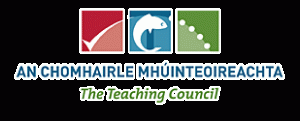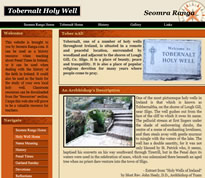
A new addition to the new website will commence in January when a series of monthly interviews will be conducted with prominent figures in the field of education. The series will kick off with an interview with Áine Lawlor, Director of the Teaching Council.
This is where visitors to the website can become involved. Áine has agreed to take questions from visitors to the website. You can submit questions for Áine via the Facebook or Twitter pages, or by posting a comment on this post. These questions must not be of a specific nature but about points in general in relation to education in Ireland and the work of the Teaching Council. I will collate / edit /amalgamate these and submit them to Áine for answers / comments. I will then put Áine’s answers together into a post on the Seomra Ranga website.
This is a great opportunity for practising teachers to put questions to the Director of the Teaching Council, so I hope that we can get a series of questions from a cross-section of the teaching community. I wish to express my appreciation to Áine Lawlor for agreeing to submit herself to questioning through the Seomra Ranga website. If there are other figures involved in education that you think would be a good interviewee, please let me know.






Regarding the recent spotlight on drug taking in the media, it would be very naive to assume that all professional bodies including teachers don’t have a certain percentage of members abusing drugs for recreational use. Anecdotal evidence suggests that cocaine abuse is widespread and has entered the middle class of society such as teachers.
Seeing as the care and safety of children is of paramount importance (plus the health and well-being of teachers), should teacher vetting not also include drug testing measures (hair follicle testing which would be less intrusive) to pre-empt dangerous situations arising in the classroom and to ensure the teaching body actively strives for professional integrity in relation to drug abuse. In some professions, passing a drugs test is a standard part of gaining employment.
I would imagine that teachers who abuse drugs aren’t particularly worried about codes of professional conduct. I feel the Teaching Council, as protector of the integrtity of the profession, needs to send out a very clear proactive message to would be drug abusers entering the profession or those already qualified and working as teachers. A document reminding members of their responsibilities in relation to drug taking would only be a token gesture. Much stronger action is required in my opinion. The Teaching Council should be seen to take a leading role against this blight on society rather than just following other professional bodies’ codes of practice and feeling the obligatory measures of ticking boxes has been met.
My questions are: does the Teaching Council have any policy with regard to drug/substance abuse?
Does the Teaching Council honestly believe that none of its members abuse drugs?
If yes, does this reflect well on the integrity of the teaching body if it is so easy to avoid detection?
If a national report in the future deduced that there was a sizable minority of teachers taking drugs, how would the Teaching Council respond to such an uncomfortable revelation then?
I’m not saying that this is the case but I believe that the Council needs to be strong and forward thinking in relation to this issue.
My question for Áine is:
One of the aims the teaching council was established for was “to promote teaching as a profession”. While I am aware a study was done last year, which showed that parents generally believe teachers are doing a good job, there is absolutely no evidence of this in the media.
I was wondering if the teaching council would consider promoting teaching as a respected profession in the media by regularly showcasing the amazing work being done by teachers all over the country. The UK ran a “those who can, teach” campaign a number of years ago as there was such negativity to becoming a teacher. It had some success. While we don’t have a shortage of teachers, there is a general negativity (mostly in the media) towards the teaching profession.
By leading on a project to promote our profession in the media, I am positive schools would support an initiative like this.
Hi
My query is about an appraisal system for teachers and principals. What are your views on appraisals and will something like this work in Ireland? Do you have any plans for this? I think it could work.
Has the Music Curriculum, and its implementation from junior infants, ever been discussed by the Council?
Hi Carmel, I’m open to correction on this, but I don’t think the Teaching Council has any remit on curricular issues. Could someone else confirm this for me?
Dear Áine Lawlor
Re: pp 16-19 CPD – A right and responsibility
I looked forward to this document but having read it still await the coherent national framework for CPD.
When is this expected to be developed by?
Has a real cost/ benefit analysis been completed on the additional value of the continued review process? Is it realistic to be proposing a framework which requires additional national structures, processes and resources within the current economic climate?
Due to both paycuts and tax increases there is severe pressure on teacher pay while teaching council fees have not reduced in parallel. Perhaps some costs could be saved by conducting only those reviews which are ‘must haves’ rather than ‘nice to have’ using the current model where SNAs, RTT and EAL teachers, school transport and smaller class sizes are considered ‘nice to have’ rather than ‘must have’.
In the meantime would it not be simpler to improve the current practice of the ‘summer course’ scheme (which I acknowledge may be so popular chiefly for EPV days allowed) which teachers have already incorporated into their family schedule:
Could the fee be scrapped along with the requirement for the course organiser to provide lunches?
Could there be some way of equally recognising courses that are completed online/ in local education centres during term time during the teacher’s own time?
Could there be some restriction on repeating the same course within a certain time frame?.
Could there be some central system of categorising and logging courses completed by each teacher with some kind of requirement to do a literacy/ numeracy course every X number of years?
Is there a way of allocating ‘points’ to certain courses that can be used towards postgraduate qualification?
Other CPD related queries
At the moment a Masters qualification on parchment from a university in any subject area warrants an increased allowance where other qualifications recognised at the same level on HETAC do not. Is this an area to be reformed in the interests of equity?
How are teachers located in rural areas to be included in the model of closer collaboration with the teacher education centres?
As a responsibility it is clear that any CPD is now to be outside the 183 days of contact time. In the recent announcement on the 36 additional hours agreed as part of the Croke Park agreement CPD time is included along with time consuming activities such as school planning, staff meetings, supervision before and after school. How many hours is it envisaged as the minimum CPD hours per annum? Will there be any leeway to average out hours over a number of years?
Sorry to hijack the questions for Áine with a comment for the last question. I just want to take issue with the concept of an SNA being categorised as “nice to have”. There has been ongoing reviews over the last year cutting down the number of SNAs that might have been considered excess to schools’ particular situations. Certainly in my school, if SNAs were cut from my staff, we would have to close our classroom for children with ASD. We would also have to ask parents to remove their children from the school as the children would not be safe. While my issue is with SNAs, there are many schools who would have similar concerns if the other candidates on her list were cut.
While Joan appears to have done a lot of research into CPD, sweeping statements judging the need for certain important roles in schools is, at best, unhelpful.
Again, I apologise for hijacking this thread with a comment, which is not aimed at Áine Lawlor.
I am just wondering, given the moves toward fostering creativity, innovation, talent, flexibility, the smart economy, the knowledge economy, STEM education would this be a good moment in time for the teaching council give a thought to looking into fostering a mandate that allows for some form of teacher training based on awarness of the Exceptionally Able and best practice methodologies of provision for this population of students? Many of these methodologies are interest based and beneficial for engaging students in general as well. I am aware that we do have Guidelines, however as far as I am aware there is no in depth series of modules on teachers courses within colleges within mainstream teachers courses, sen, resource or otherwise, or on Educational Psychology courses. If we are to run an inclusive educational system, we need to ‘include’ all populations, and to ignore the needs of this one means a tragic loss of potential, both personally for the student, and nationally for our nation. I would like to see some formal movement towards recongnising training needs of educators which may come into contact with these children, and the existance of their needs.
Hi Leslie, I’m afraid I have already submitted the list of interview questions for Áine, so unfortunately your point on Gifted Education cannot be included. However, thanks for raising awareness of this sometimes “forgotten” population in our education system.